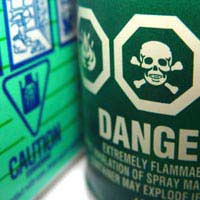
Every year many children and pets – and even adults – are injured or affected by household chemicals. Most people don’t realise the many potentially dangerous chemicals contained in the cleaning agents used around the home and often carelessly stored in cupboards. However, some effects can be very serious, even fatal, so it pays to have a good knowledge of the hazards from common household chemicals and the correct way to handle them safely.
Examples of household products which contain harmful chemicals, in particular toxic fumes, include carbon monoxide, adhesives, chlorine, cigarette smoke, bleach, cleaners, floor polish, nail polish, nail polish remover, perfume, pesticides, formaldehyde, hair dye, hair spray, house paint, flea bombs, flea collars, kerosene, matches, mothballs, oil paint, oven cleaner, overheated nonstick cookware, suntan lotion, paint remover, permanent markers, permanent wave solution, shoe polish, spray starch, surgical acrylics, spot remover, toilet bowl cleaners and wax.
Do
- Do store flammable liquids such as gasoline, benzene, lacquer thinner and acetone in approved safety cans, outside the home (e.g. in the garage). If flammable materials must be stored in the home, keep them away from sources of heat, gas appliances, open flames and out of the reach of children and pets.
- Do store containers in a well-ventilated area and secure the lids tightly, to prevent spills.
- Do store any oily waste and polishing cloths in securely sealed containers, preferably metal cans.
- Do keep the windows open and the area well-ventilated when using household chemicals.
- Do read the labels and take note of any warnings.
- Do stop using the chemicals immediately if you feel dizzy, nauseous or get a headache. If symptoms persist, see a doctor.
- Do take great care when using chlorine bleach: Chlorine gas is also a respiratory irritant – it reacts with the moisture on the mucous membranes in the nose and throat and forms acids which burn the membranes. It can also burn the skin. In fact, a few deep breaths of pure chlorine gas can be fatal. Therefore, always wear protection (e.g. gloves, goggles and mask) when using chlorine, make sure the area is well-ventilated and limit your exposure to the shortest time possible.
- Do always keep cleaning products in their original containers – never store household chemicals or cleaning products in old food containers.
- Do make sure you stack products securely so they won’t tip or topple
- Do discard all old or unused cleaners promptly and correctly.
Don’t
- Don’t keep combustible liquids such as paint thinner, kerosene, charcoal lighter fluid, and turpentine near heat sources.
- Don’t allow your body to come into direct contact with household chemicals – always wear a mask, rubber gloves and protective eyewear when using them, particularly anything corrosive.
- Don’t wear contact lenses when using household chemicals.
- Don’t inhale any fumes – always make sure the area is well-ventilated (e.g. open windows, use a fan) and wear a mask.
- Don’t smoke when you’re using household chemicals and cleaning products.
- Don’t EVER mix your cleaning products – this can create a combination of chemicals which are volatile, flammable or incredibly toxic – or set off a dangerous, explosive chemical reaction. In particular, NEVER mix chlorine bleach with ammonia (or even urine), as the chemical reaction triggered can produce poisonous fumes that can cause a severe respiratory reaction, burning in the throat and eyes and serious lung irritation. In addition, chlorine can react with organic material to form trihalomethanes (a well-known one is chloroform) which are carcinogenic compounds.
- Don’t inadvertently mix chemicals by pouring cleaners, one at a time, down the faucet or using the same cloth to apply two different cleaners.
- Don’t store vast amounts of household chemicals around the home – only buy what you need and use it all up before you buy more. This keeps chemicals and cleaning products around the house to an absolute minimum.
Most of all, make sure all chemicals are kept out of the reach of children and pets. If you are really worried about the dangers of household chemicals, you may want to consider switching to many of the environmentally-friendly alternatives which do not contain hazardous chemicals – there are many natural, non-toxic and non-chemical products on the market today for cleaning bathrooms and kitchens and removing stains.